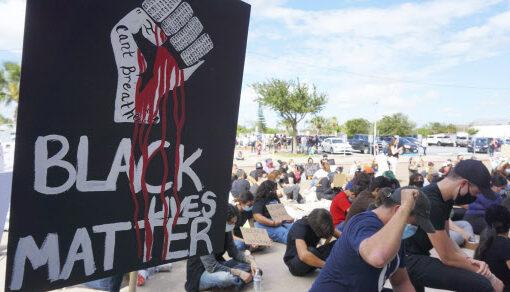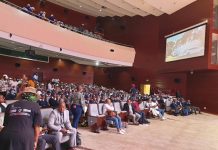Africa-Press – Lesotho. To stand a chance of ending the structural racism that plagues police departments in many US cities, people must come together to form a collective, popular and powerful voice.
George Floyd’s murder has provoked a collective response that is more powerful and far-reaching than the protests which took place after Michael Brown’s death in Ferguson in 2014.
This latest passionate protest movement, which has spread across tens of cities, is part of a long history of protests organised against police violence that have been central to African American activism for a century.
In the early 1920s, the National Association for the Advancement of Colored People (NAACP), the main African American civil rights organisation, denounced the collusion between certain police and justice departments and white supremacist organisations like the Ku Klux Klan (KKK), which back then was all-powerful in the American Deep South.
KKK leaders wore sheriffs’ badges by day and a white pointed hoods by night. In large cities in the north, police officers, virtually all of whom were white until the 1960s, were accused of violence, such as in Chicago in 1919, when they took part in racist attacks in black neighbourhoods.
During the Civil Rights Movement, Martin Luther King, Jr did not hold back from condemning violent and racist police officers. In his most famous speech, “I Have a Dream”, he warned: “We can never be satisfied as long as the Negro is the victim of the unspeakable horrors of police brutality.
” The combat against segregation and violence would go on to find echoes in Africa.
In 1964, Malcolm X, who had by that time split with the Nation of Islam, made a long pilgrimage to Mecca, where he converted to Sunni Islam, and then travelled across many African countries, meeting with political leaders along the way.
He also attended, as an observer, the Organization of African Unity’s (OAU, the organisation that preceded the African Union) summit in Cairo in July 1964, during which he called on the UN to conduct an investigation into the persecution of African-Americans.
In a statement released a few days ago, Moussa Faki Mahamat, the current Chairperson of the African Union Commission, fittingly recalls that during the Cairo summit, the OAU affirmed its “rejection of […] discriminatory practices against Black citizens of the United States of America.
”
In 1966, the founding of the Black Panther Party for Self-Defense was motivated by police behaviour, which the organisation sought to physically confront using patrols of armed militants in black neighbourhoods.
Violent incidents between police officers and Black Panther members multiplied. Huey Newton, one of the founders of the Black Panthers, was accused of murdering a white policeman, John Frey, in October 1967. A number of Black Panther militants, such as Fred Hampton in Chicago, were killed by law enforcement.
Even though the Black Panther Party attracted just a small fraction of the black community, its militants were often viewed in a positive light in the ghettos, as residents were exasperated with the arrogance of a brutal and at times corrupt police force.
After the riots of 1967, almost all of which were caused by an altercation between black youth and the police, a US federal commission recommended, among other measures, the hiring of black police officers to help change the racist culture of the US police.
The idea was good, but inadequate. In Baltimore, three of the six police officers charged in the death of Freddie Gray in April 2015 were black. On top of recurring violence, everyday relations between African-Americans and the police are problematic.
Many African-Americans are caught up in a vicious circle of arrests for minor offences, unpaid fines which are absurdly increased to boost municipal coffers, and cancelled drivers’ licences, sometimes leading to firings and evictions.
How could a population treated in such a manner not revolt when, for good measure, a policeman coldly suffocates a man whose only “crime” was being black? Too many cities have police departments with deeply rooted structural racism and this has continued to ruin the lives of African-Americans for decades. Serious efforts have been made here and there, but they are still falling very short of what is needed.
When it comes to approaching this situation – unacceptable in a major democracy – the federal government is relatively powerless: of course, the Department of Justice can press charges for civil rights violations, but the courts give police officers absolute freedom to decide to use their weapons if they feel their life is in danger.
Consequently, people must come together to form a collective, popular and powerful voice in order to change the status quo. For starters, the status quo can be shifted by charging Floyd’s killer with murder instead of manslaughter.
Two aggravating factors complicate the current situation. The first is the COVID-19 health crisis, which has killed more than 100,000 Americans, with African-Americans making up one-quarter of these deaths.
Especially hit hard and grieving, members of the black community often feel their lives matter less in the eyes of authorities: their social and work situation, their health condition and the cost of health insurance are all factors influencing this dismal tally.
The second is Donald Trump himself, who, even before he was elected to the White House, stated and reiterated his hostility towards the Black Lives Matter movement, and sent numerous friendly signals to racist, white supremacist movements.
In recent days, he has stepped up his venomous tweets, calling the protesters “thugs” and suggesting the use of force to get them to go back home. While you would expect a president to rise to the occasion, especially in difficult times, and offer a powerful, unifying message, Trump has done the opposite: he tweets and shuts himself away in the White House. The end of his term of office, which combines a health, economic and – with Floyd’s death – political crisis, is the stuff of nightmares.
For More News And Analysis About Lesotho Follow Africa-Press






